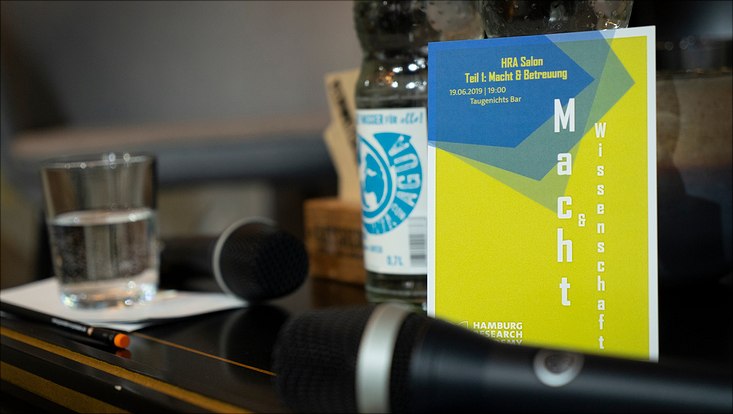Double dependency relationships during doctoral research
“As a doctoral researcher, you are dependent on your supervisor in a number of ways,” observed Dr. Leonard Borchert, a postdoctoral researcher at the Max Planck Institute for Meteorology, at the beginning of the discussion. In the model for doctoral research used in Germany, explained Dr. Borchert, professors usually function as both supervisors and evaluators at the same time. This situation is further compounded by financial dependencies as a result of employment relationships and the power professors have to recommend researchers for jobs, he added. “Supervisors don’t just determine whether or not you have a job today, they often determine whether or not you will be offered a job in your research field in the future as well.”
Helga Nolte, a member of the audience from the Ombuds Office at Universität Hamburg, underscored how power is perceived differently on different levels of hierarchy. Most supervisors don’t consciously intend to wield power over their doctoral researchers, said Nolte, but the researchers are always cognizant of the dependency and it dictates their behavior.
Good supervision can be learned
Prof. Dr. Dr. hc. mult. Katharina Boele-Woelki, President of the Bucerius Law School, is well acquainted with 2 academic supervisory systems, the German and the Dutch models. According to her, good supervision requires mutual trust. Although she has had many positive experiences in both academic systems, she views the “vicious supervisory circle” as especially dangerous. “It is alarming to note that those who have suffered under power-crazy supervisors later often display the same type of behavior toward their own doctoral researchers,” she observed. How can this vicious circle be broken and systematic improvements in the German supervisory system implemented? Prof. Dr. Brooke A. Gazdag, a leadership specialist from LMU München, offered hope: “Good leadership and supervision really can be learned!”

Ideas for improving supervisory relationships
Many good ideas for improving supervisory relationships and preventing misuse of power were collected over the course of the evening. Here are several suggestions from the discussion:
- introduce clear supervisory agreements
- promote training courses for good supervision through incentive systems or mandatory requirements (i.e., as a standard component of academic search procedures)
- enforce separation of supervision and evaluation
- further establish the use of supervisory panels as alternatives to individual supervision
- limit the number of doctoral researchers per supervisor
- create control mechanisms for poor supervision or leadership at higher education institutions, taking academic freedom into account (e.g., elimination of doctoral positions in the case of repeated misuse of power)
- make points of contact accessible even to external doctoral researchers
Tips for doctoral researchers
What can doctoral researchers do to actively improve their own supervisory situation? Here are a few recommendations from the discussion:
- Gather as much information as you can about potential supervisors before starting your doctoral research. Talk to other doctoral researchers and examine the websites and publications from the respective research groups. The way in which the team is presented and the authorship details of academic papers often reveal a great deal about internal power structures. You can find additional tips for selecting a supervisor on websites such as the Higher Education Compass and ZEIT Campus.
- “Leadership from the bottom up”: In many cases, you can determine and positively influence the course of your relationship to supervisors. Agreeing on expectations, communicating clearly, and preparing thoroughly for meetings will help.
- Demand a clear-cut supervisory agreement outlining mutual expectations. Recommendations from the German Research Foundation (Deutsche Forschungsgemeinschaft, DFG)
- If conflict does arise, identify appropriate points of contact (e.g., conflict mediators, the Ombuds Office, the Staff Council, Hamburg Research Academy) as soon as possible to prevent escalation.
- Cultivate and make use of networks. Doctoral researchers networks can provide you with information on topics such as standards for supervisory relationships and serve as a voice for their members. The Hamburg Research Academy has a Doctoral Council since March 2019.
What next?
The next two HRA Salons will be devoted to the overarching topic of Macht und Wissenschaft (power and academia). An English-language HRA Salon, Power and Research Funding will be held on 27 November 2019. This session will examine the power and responsibility held by funding providers. More information will be available soon.
The Hamburg Research Academy is examining the topic of doctoral supervision in various projects: It is supporting the MIN Faculty of Universität Hamburg in introducing individual development plans (IDPs)—a method to improve communication in supervisory relationships and help doctoral researchers develop their skills. The Hamburg Research Academy is also designing a “train the trainer” program to assist supervisors in their work.
We are thrilled by the strong participation in this discussion and are looking forward to the next HRA Salon!
Stay in the loop
You want to stay up to date about the HRA’s offerings? Or sign up for the HRA email list at office"AT"hra-hamburg.de.












